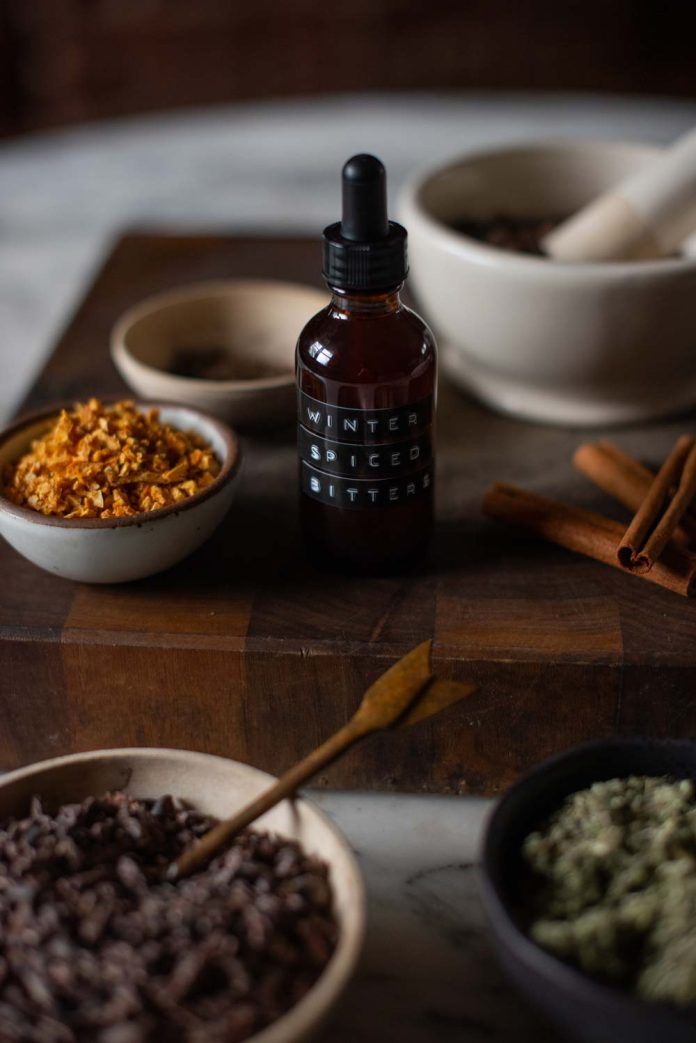Winter Spiced Herbal Bitters for Digestive Health
Recipe and Photography by Sarah Snyder
Other text by Meghan Gemma
Everyone can benefit from a bottle of herbal bitters!
Paradoxically, bitter herbs make life sweet, as they have a profound effect on our enjoyment of food—one of life’s great pleasures. You might also say they improve our relationship with food, as many digestive woes can be corrected simply by adding herbal bitters to the diet.
Herbal bitters benefits include:
- Improve symptoms of digestive turmoil, including gas, bloating, cramps, indigestion, nausea, constipation, and even post-meal crankiness
- Curb sugar cravings
- Promote the growth of healthy intestinal flora
- Facilitate detoxification through their support and stimulation of the liver
It’s optimal to ingest bitters twenty minutes before eating, but if you forget, simply take them when you begin to eat. Try keeping your bitter tinctures on the kitchen table as a reminder. Bitters must be tasted to exert their medicinal effects. A few drops are all that’s needed.
The following herbal bitters recipe is an excerpt from our FREE Winter Seasonal Guide.
Sprinkled with snow dreams and frosted by starlight, the Winter Seasonal Guide is an ode to tending ourselves and our loved ones through the dark moons of winter, a guide for burnishing ourselves to brightness with the plants at our side.
It burns with three complementary candles:
- The Winter Apothecary. A tour of essential herbal wisdom for winter health and levity.
- 7 Healing Herbs for Winter. A materia medica spotlight on seven botanicals embodying the season’s herbal spirit.
- Herbal Recipes for Wintertime. A collection of festive, warming, and health-enhancing recipes.

Winter Spiced Herbal Bitters Recipe
Equipment
-
32 oz. glass jar
-
Glass dropper bottles – Optional
Ingredients
- ½ cup dried hawthorn berries (Crataegus spp.) or double the amount of fresh berries
- 2 Tbsp. cacao nibs (Theobroma cacao)
- 2 Tbsp. dried orange peel (Citrus x sinensis)
- 1 Tbsp. hulled cardamom seeds (Elettaria cardamomum)
- 2 tsp. cut and sifted dried mugwort leaves (Artemisia vulgaris) or double the amount of chopped fresh leaves
- 2 cinnamon sticks (Cinnamomum verum)
- 2 cups brandy or vodka
Instructions
-
In a 32 oz. glass jar, combine all herbs and spices.
-
Cover with alcohol of choice. Brandy makes for a smooth and drinkable blend, while vodka provides a stronger and more medicinal extraction.
-
Store in a cool, dark place for six weeks, shaking often.
-
After six weeks, strain out the herbs and store your bitters in a glass jar in a dark cabinet. Best used within one year.
Looking for more medicinal recipes for wintertime?
Find more herbal allies for the chilly season on our blog, including our articles on:

Goldenrod Tincture Formula
This goldenrod tincture blend is a helpful internal remedy for congestion due to seasonal allergies, head colds, or sinus infections.

Mighty Pine Tops Tea
This tea recipe combines pine tops with dried peppermint and catnip for relief from sinus and lung congestion.

Medicinal Garlic Sauce
We almost always have a batch of this sauce on hand. It’s a convenient way to add fresh garlic to dishes just before serving.
Meet Our Contributors:

SARAH SNYDER grew up in a small wooded town outside of Charlotte, NC. She studied music in college before moving to Asheville, NC to study pastry arts. Here she developed a love for plants, gardening, medicine-making, and homesteading. She has worked as a photographer, pastry chef, journalist, and social media manager.
Most days you can find her reading with her dog and a mug of tea, getting the perfect shot of her garden, trying out yet another craft, or wrangling chickens back into the yard.

MEGHAN GEMMA is one of Chestnut School of Herbal Medicine’s primary instructors through her written lessons, sharing herbal and wild foods wisdom from the flowery heart of the school to an ever-wider field of herbalists, gardeners, healers, and plant lovers.
She began her journey with the Chestnut School in 2010—as an intern and manager at the Chestnut Herb Nursery and then as a plant-smitten student “back in the day” when the school’s programs were taught in the field, and later she became part of the school’s writing team. Meghan lives in the Ivy Creek watershed, just north of Asheville, North Carolina.
Interested in becoming a contributor?
© Chestnut School of Herbal Medicine and chestnutherbs.com, 2011-2024. Unauthorized use and/or duplication of this material without express and written permission from this site’s author and/or owner is strictly prohibited. Excerpts and links may be used, provided that full and clear credit is given to Chestnut School of Herbal Medicine and chestnutherbs.com with appropriate and specific direction to the original content.
Want to take a deeper dive into medicinal herbs and their uses?
Our 1,000-hour Herbal Immersion Program is the most comprehensive handcrafted online herbal course available, covering botany, foraging, herb cultivation, medicine making, and therapeutics.

The post Winter Spiced Herbal Bitters for Digestive Health appeared first on Chestnut School of Herbal Medicine.




